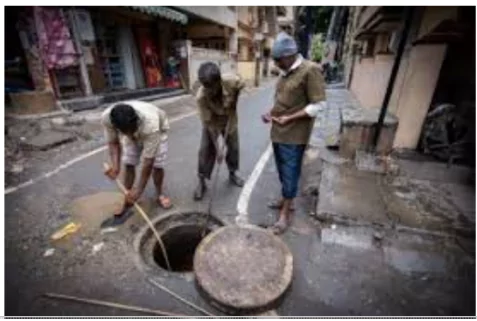National Human Rights Commission (NHRC) has urged immediate action to eradicate manual scavenging and hazardous sewer cleaning based on the Supreme Court’s 2023 judgment (Dr. Balram Singh v/s Union of India, 2023 INSC 950).
Key Observations by NHRC
- Despite a complete ban on 29th January 2025 in six major cities — Delhi, Mumbai, Chennai, Kolkata, Bengaluru, and Hyderabad — reports of manual cleaning still continue.
- The practice of manual scavenging is a gross violation of human rights, especially:
- Right to life with dignity
- Right to equality before the law
Supreme Court’s 14 Directives in Dr. Balram Singh v/s Union of India case, 2023 INSC 950
- National Policy Framework: Union Government will frame clear policies to end manual sewer cleaning in all government bodies and departments.
- Ban on Sewer Entry in Contracts: No contract should allow any individual to physically enter sewers for cleaning purposes.
- State-Level Enforcement: All States and UTs must strictly implement the Union’s guidelines at local and municipal levels.
- Comprehensive Rehabilitation: Sewer workers and their families must be given jobs, education support, and skill training.
- Scholarships for Dependents: Children of manual scavenging victims must receive scholarships and other educational aid.
- Increased Death Compensation: Compensation for sewer deaths is raised from ₹10 lakh to ₹30 lakh.
- Pending Compensation Cases: If dependents have not received compensation, the new amount must be paid without delay.
- Disability Compensation: ₹20 lakh for permanent disabilities and ₹10 lakh for other sewer-related disabilities.
- Strict Liability in Outsourced Work: Governments must cancel contracts and impose fines for sewer deaths in outsourced work.
- Standardized Model Contracts: New model contracts will include strict safety rules and penalties for violations.
- Nationwide Survey: The National Commission for Safai Karamcharis(NCSK), National Commission for Scheduled Castes (NCSC), National Commission for Scheduled Tribes (NCST) and the Social Justice Ministry will conduct a national manual scavenging survey in one year.
- Monitoring Committees: States must form monitoring bodies at district and state levels with no vacancies.
- Centralized Monitoring Portal: An online portal will track sewer deaths, compensation, and rehabilitation efforts.
- Training and Awareness Drives: Government will run training and awareness programs for officials and the general public.
What is Hazardous cleaning and Manual Scavenger?
As per Section 2(d) of the Prohibition of Employment as Manual Scavengers and their Rehabilitation Act, 2013:

- Hazardous Cleaning
- Hazardous cleaning refers to manual cleaning of sewers or septic tanks without protective gear and safety precautions.
- It becomes hazardous when employers fail to ensure safety equipment and procedures as prescribed by law.
- Manual Scavenger : As per Section 2(g) of the same Act:
- A manual scavenger is a person employed to manually clean, carry, dispose, or handle human excreta.
- This applies to insanitary latrines, open drains, pits, railway tracks, or any other place notified by the government.
- The work must be done before the excreta fully decomposes.
- The term also includes any form of manual scavenging in such settings.
Government Steps to End Manual Scavenging
I. Legislative Measures
- Prohibition of Employment as Manual Scavengers and their Rehabilitation Act, 2013
- Prohibits the employment of manual scavengers.
- Provides for rehabilitation of manual scavengers and their families.
- All offences under this Act are cognizable and non-bailable.
- Employment of Manual Scavengers and Construction of Dry Latrines (Prohibition) Act, 1993
- Bans the employment of manual scavengers.
- Punishes individuals who construct dry toilets or latrines.
- Other Supportive Laws
- Protection of Civil Rights Act, 1955 – Ensures equal rights and dignity.
- SC/ST (Prevention of Atrocities) Act, 1989 – Provides protection from caste-based discrimination and exploitation.
- Manual scavenging, a caste-based oppressive practice, is addressed under this Act to ensure dignity and equal rights for affected individuals.
II. Government Schemes
- National Action for Mechanised Sanitation Ecosystem (NAMASTE), 2023
- A Central Sector Scheme under the Ministry of Social Justice.
- Implemented by National Safai Karamchari Finance & Development Corporation.
Aims to ensure safety, dignity, and rehabilitation of hazardous sanitation workers.
- Swachh Bharat Mission (Urban 2.0)
- Launched in 2021, Swachh Bharat Mission (Urban 2.0) aims to make all cities garbage-free and improve urban sanitation.
- Overseen by the Ministry of Housing and Urban Affairs (MoHUA).
- Objectives: Ensure scientific waste management and eliminate legacy dumpsites.
- Promote source segregation of solid waste using the 3Rs principle (Reduce, Reuse, Recycle).
III. Dedicated Institutions
- National Commission for Safai Karamcharis (NCSK)
- Set up in 1994 as a statutory body under the National Commission for Safai Karamcharis Act, 1993.; Functioned as a statutory body until 2004, when the Act lapsed.
- Now functions as a non-statutory body under the Ministry of Social Justice.
- Focuses on the welfare and rights of sanitation workers.
- National Safai Karamchari Financial Development Corporation (NSKFDC), 1997
- A non-profit company under the Ministry of Social Justice.
- Provides loan and non-loan-based schemes for the upliftment of Safai Karamcharis.
Additional Reading: NHRC
![]() 16 May 2025
16 May 2025

